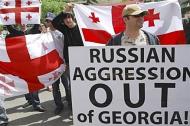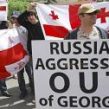
THE WEST CAN RESPOND MORE EFFECTIVELY TO RUSSIA’S ASSAULT ON GEORGIA: PART II
Publication: Eurasia Daily Monitor Volume: 5 Issue: 88
By:

Russia has openly recognized politically and “legally” (in terms of Russian law) the secessions of Abkhazia and South Ossetia from Georgia and has capped that recognition with acts of military aggression in Georgian territory and air space. This is the cumulative meaning of Russia’s recent moves: the presidential decree of April 16, establishing direct official relations with the two secessionist authorities and recognizing their decisions and acts as legally valid; the downing of a Georgian unmanned aircraft on April 20 by a Russian plane; installation of Russian border checkpoints on the Georgian side of the border in the Abkhaz sector; and unilateral deployment of additional Russian troops to Abkhazia (citing Russia’s constitution as one justification), despite Georgia’s protests in late April-early May (see EDM, May 1, 5, 6, 7).
These moves conclusively disqualify Russia from its commanding role as mediator/facilitator in the political negotiations and as military “peacekeeper” in those two conflicts. That Russia was a direct party to the conflicts had been obvious since their inception. Nevertheless, international organizations and the West conceded the arbiter’s role to Russia, on the basis that Russia recognized Georgia’s territorial integrity and sovereignty at least on paper. By the same token, Russia was careful to maintain that front.
After its latest moves, however, Moscow has forfeited any claim as main mediator and sole “peacekeeper” in these conflicts. By advancing from de facto to “legal” recognition of the secessions, Russia has exposed these conflicts’ real nature, which has long since mutated from local “inter-ethnic” conflicts into interstate conflicts, conducted by Russia on Georgian territory.
In her testimony on May 6 to the European Parliament, European Union External Affairs Commissioner Benita Ferrero Waldner made it clear that Russia was to be regarded as a party to the conflict (Civil Georgia, May 6, 7). The U.S. White House statement also on May 6 made that same point. It reflects a growing realization in the West, that is finally catching up with reality. It has now become untenable, at least publicly, to argue that Russia is an impartial arbiter between the secessionist authorities and Georgia, let alone between Russia itself and Georgia.
This new realization, however, has yet to translate into action toward transforming the peacekeeping and negotiating formats from mere covers for Russian monopolism into genuine international formats. On May 5 Georgia’s ambassador in Brussels, Salome Samadashvili, appealed to the EU to “get serious about starting talks on changing the formats. The EU can step up and be the real objective broker” as well as “send a very clear signal to Russia that there will be a political cost to relations between Russia and the EU” if Russia continues flouting international law in Georgia (EurActiv, May 5).
Tbilisi has not asked the EU at this time to initiate an international peacekeeping operation in Georgia. Rather, it seeks a discussion with the EU, the United Nations, and the OSCE about steps to transform the existing peacekeeping and negotiating formats. The EU collectively will be slow to move to action. Reflecting institutional inertia and undoubtedly his instructions from the top, the EU’s Special Representative for the South Caucasus, Peter Semneby, answered ambivalently: “If the parties desire a stronger role for the EU, the EU will look at the possibilities, given that the existing peacekeeping force does not seem to enjoy the trust of all the parties and has become a source of disagreements … a source of controversy between Russia and Georgia” (interview with RFE/RL, May 3).
By this logic, an EU peacekeeping role would be subject to consent from “the parties,” i.e., Russia could veto it. At the same time and by a converse logic, Georgian disagreement with Russian “peacekeeping” is not yet seen as a compelling reason for EU involvement in internationalizing the Russian operation.
As a minimal and symbolic measure, in order to discourage further Russian military moves, the EU can send top-level officials on visits to Tbilisi. The EU can also offset Russian “hard power” with EU “soft power” through reconstruction assistance in the conflict areas, preferably channeled through Tbilisi-loyal authorities in Upper Abkhazia and the Dmitry Sanakoyev-led authorities in South Ossetia. The EU is being unaccountably slow to endorse, or contribute input to, Georgia’s recent twin proposals: to develop a concept of autonomy for Abkhazia and to internationalize the negotiations on South Ossetia in a 2+2+2 format (Georgia and Russia, the EU and the OSCE, Tskhinvali authorities, and Sanakoyev authorities). Georgian officials familiarized their EU counterparts with these proposals during emergency visits to Brussels, following the latest Russian military moves in Abkhazia (Messenger, Civil Georgia, May 6, 7).
Looking beyond the current crisis, the EU could initiate the transformation of Russian “peacekeeping” operations in Georgia. Such transformation would involve not only their internationalization but also their “civilianization,” that is, turning them from military operations into mainly civilian ones, with police units and some military observers. Free from Russian veto power (unlike the United Nations and the OSCE) and having itself deployed civilian police operations in post-Yugoslav conflict areas, the EU can demonstrate the use of this soft-power instrument in Georgia.




